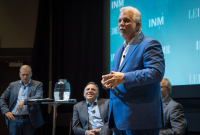Support strong Canadian climate journalism for 2025
Jean-Louis Themis believes the true measure of a society is how well it eats.
If that thinking were more widespread, the retired chef and cooking teacher would be a shoo-in to enter Quebec's legislature after the Oct. 1 election.
Themis, 65, is the founder and lone candidate of the Parti culinaire du Quebec, which believes a well-fed society would be healthier, happier and more generous.
His new party is just one of an eclectic mix on the political fringe hoping to tantalize voters in ridings across the province.
Some 940 candidates are on the ballot representing 18 registered parties, according to Elections Quebec. Another four official parties are sitting this one out.
The hopefuls include such mainstays as the Marxist-Leninist party and Citoyens au Pouvoir du Quebec, which promises direct democracy. They are running alongside more recent creations, including a party that wants spoiled ballots to count for something and a separatist party with a twist — it wants Quebec to join the United States.
Themis dreams of creating a "gastrocracy," where pipelines would be banned if they crossed agricultural land or fishing grounds, farmers would be the highest paid members of society and hospital patients and residents in seniors' homes would eat delicious food every day.
Born Jean-Louis Themistocle, he says the way food is grown and consumed touches many sectors of society, including health, transportation, manufacturing, and politics.
"Buying a carrot can be a political act, if I have a choice between buying an American one or a Quebec carrot," he said from his campaign headquarters, his condo in the Montreal riding of Laurier-Dorion.
The former author, teacher and TV chef, along with his late wife, co-founded "Cuisiniers sans frontieres" — an organization that provides culinary vocational training to people in developing nations, including his home country of Madagascar.
It was through his work with the organization that he became even more convinced of the power of food to alleviate poverty and provide opportunities, he said.
"Food can change lives, cooking can change lives, if we share it," he said.
For Quebecers whose appetite for politics is waning, another party wants to help them get more out of a spoiled ballot.
Parti Nul has been around since 2009 and is taking part in its third campaign. Leader Renaud Blais sees his party as an outlet for the disenchanted.
"The Parti Nul is about making spoiled ballots count," said Blais, one of 16 candidates running for the party this year.
A spoiled ballot could be the result of a deliberate act or a mistake in the voting booth, but with the Parti Nul the intent is clear.
"Our idea is to make sure these votes — which are a valid democratic opinion — are counted in the results," Blais said. He hopes a visible "wave of protest" will prompt people "to think about new ways to implement democracy."
In the 2014 election, about 7,500 Quebecers voted for the party's 24 candidates. By comparison, there were more than 62,000 spoiled ballots.
In a province where talk of sovereignty never totally disappears, Hans Mercier's Parti 51 is advocating a third option for Quebec: joining the United States.
Mercier, a lawyer from the Beauce region, last year revived the long-dormant Parti 51 and is one of five candidates running across the province.
"I would say there's actually a very positive response, even considering the current presidency which is not the most popular in Quebec," Mercier said.
He says party supporters include traditionally federalist anglophones and sovereigntist francophones, who have set aside their differences over Quebec's national question to embrace the idea of becoming the 51st state.
Mercier said "the best constitutional option" for Quebecers is the U.S. Constitution. "We have a lot in common, we are surrounded by American culture ... it's very natural for a lot of people."
One thing all of the lesser-known parties contend with is a lack of resources and media attention.
Themis said his campaign has been a low-key affair, run mostly by him and roughly a half-dozen volunteers, including his adult daughter.
Every day, he hops on his campaign vehicle — a red electric scooter — and drives to different schools in his riding, where he makes his pitch to parents.
In a pineapple-patterned shirt, red-and-yellow scarf, and polka-dot helmet with his picture taped to it, he knows he comes across as a quirky figure.
The first reaction to his campaign is usually laughter, which he says is just fine since politics, like a good meal, is about making people happy.
"If I make one person smile, I've already accomplished something," he said.





Comments